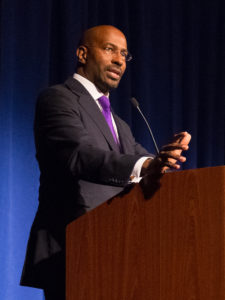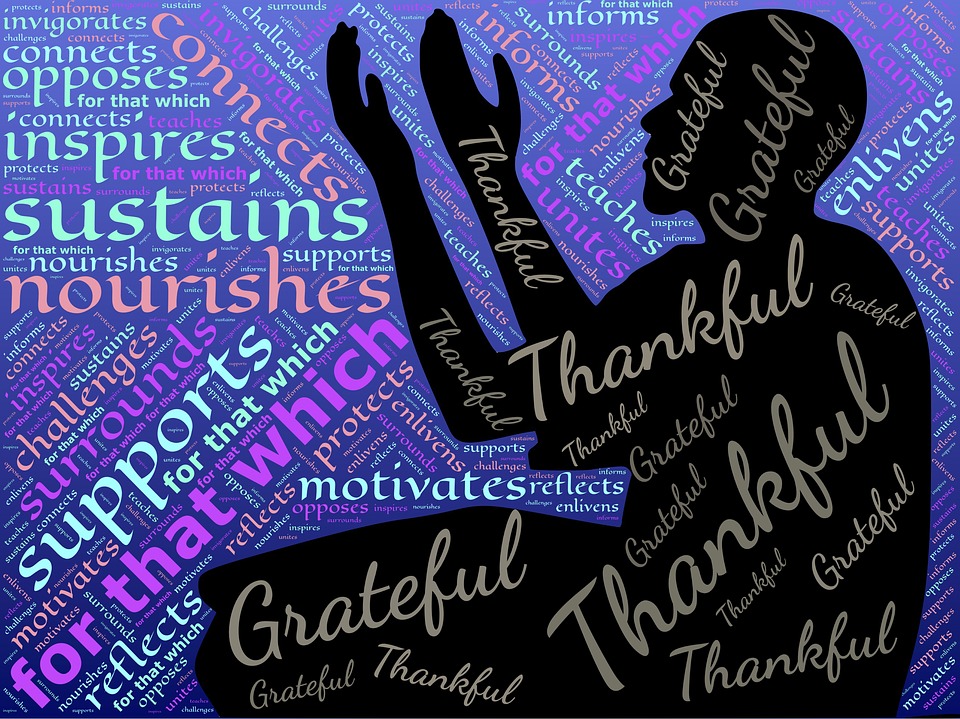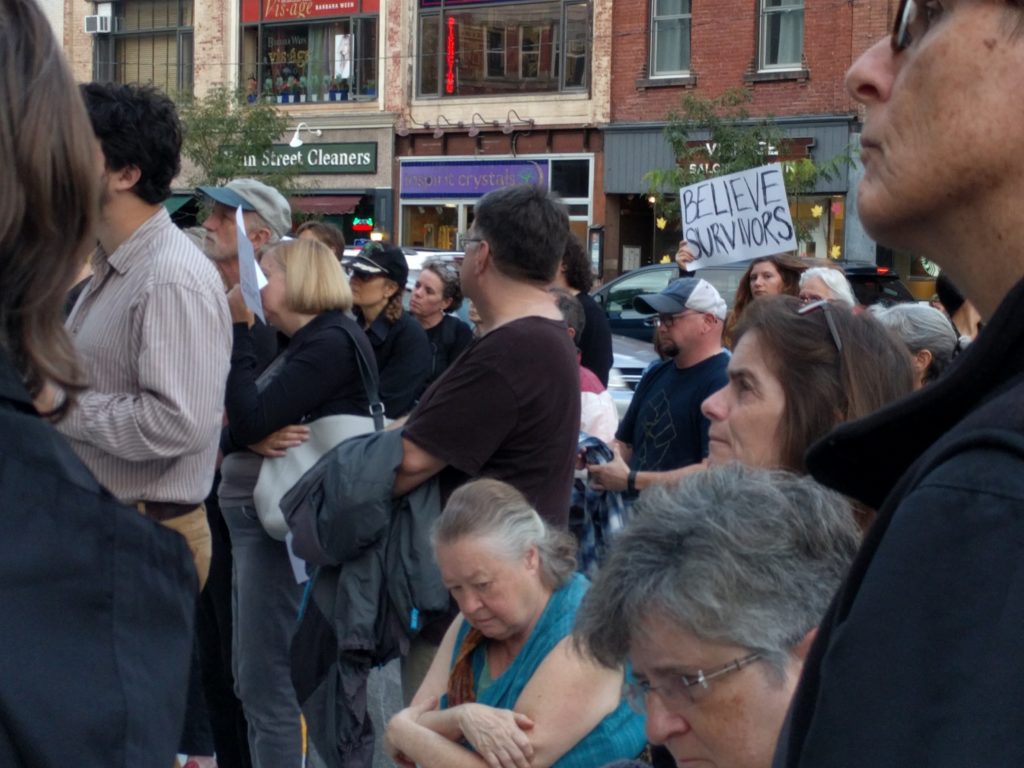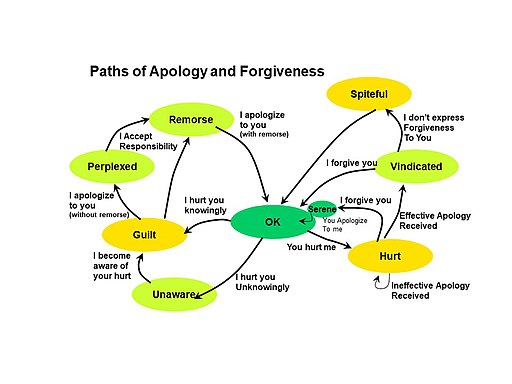Category: Ethics: General
Vulnerability, Shame–and 3 Regrets
We hear a lot about being shamed for doing the right thing–yet there’s little mention of the internal shame we might feel when we FAIL to step up and be vulnerable. I have very few regrets in my life, but I feel shame about three incidents where I had the chance to do the right thing and didn’t take it: one was right after we bought our first house and our immediate neighbors invited us over to get acquainted–and made a racist remark about Puerto Ricans. Knowing I was going to have to live next to these people for years, I chose to remain silent and I still feel shame over that. The other was many years earlier, when, as a teenager in high school, I walked by a large man who was addressing a petite young woman. He turned straight to me and asked, “doesn’t she have tiny t–ts?” I knew I didn’t want to encourage him but at 14 or 15, I didn’t yet have the languaging to effectively interrupt that kind of oppression. I didn’t know how to throw some comfort her way without sending him into a potentially violent rage against her. I took the cheap cop-out, “I can’t see. Her arm is in her way.”
The third was even earlier. I think I was 11. My only summer in sleep-away camp. There were six of us in my bunk. Three were bullies, two of us were constantly picked on, and the 6th was our protector. Near the end of that horrible two weeks, the bullies forced me and the other scrawny kid to fight each other. He was even weaker than me. Shamefully, I chose the self-protection of not getting beaten up by the three thugs. I hit him as gently as I could. Our protector (a small-framed boy, but one with enormous self-confidence) walked in near the end of the battle and was disgusted with the me. I lost his respect. He gained even more respect from me. And I don’t think I’ve hit anyone since.
And I was enormously proud decades later when my daughter, then just six years old, interrupted the bullying of the odd-boy in her kindergarten.
The shame of letting others down and not being true to myself I felt in these three incidents is very different than the shame I felt at about age 11 when I experienced a rape by a stranger on the street (yeah, I’m a male #MeToo). I felt horribly unclean and ashamed, but I knew this was out of my control. Still, it was four years before I could bring myself to tell anyone–and I don’t think it’s a coincidence that I didn’t discover my bisexuality until I moved 600 miles (1000 km) away from that stairwell.
There are plenty of times when I did speak out. When I did the right thing. When I took some personal risk. But these three failures still hang over me. The most recent was in 1986, yet, all those decades later, I am still ashamed.
Are there times in your life that YOU regret not stepping up?
Thank your critics! Yes, really (and sincerely)
Peter Beinart: A Jewish Perspective on Solving the Israel/Palestine Crisis
 Jews, who were forced away from Israel/Palestine more than 2000 years ago, have the “right of return” automatically. They can come and instantly claim Israeli citizenship, and the government helps them resettle–even offering intensive Hebrew language instruction. But Palestinians, who were only forced off their land in 1948, have no such right–even though some of those people are still alive and no one is more than four generations into the exile. Meanwhile, in many parts of the country, Palestinians can’t get building permits from Israeli authorities. “But they still need places to live. They still have children.” So they build illegally, and when Israel wants to up the repression, the government bulldozes these houses.
Jews, who were forced away from Israel/Palestine more than 2000 years ago, have the “right of return” automatically. They can come and instantly claim Israeli citizenship, and the government helps them resettle–even offering intensive Hebrew language instruction. But Palestinians, who were only forced off their land in 1948, have no such right–even though some of those people are still alive and no one is more than four generations into the exile. Meanwhile, in many parts of the country, Palestinians can’t get building permits from Israeli authorities. “But they still need places to live. They still have children.” So they build illegally, and when Israel wants to up the repression, the government bulldozes these houses.
That inequity made CNN political commentator and journalist Peter Beinart (latest book: The Crisis of Zionism) very uncomfortable. As he struggled with the ethics of this inequality, he began learning more. Beinart is Jewish, has lived in South Africa, Israel, and the US, and is very aware of the ethical teachings in classical Judaism about treating the stranger well, doing good deeds, being a good guest when you travel to others’ lands, and treating people fairly.
Over 200 people gathered on Zoom June 8, 2021 to hear Beinart discuss the prospects for peace and justice in the Middle East in a program for Critical Connections entitled “Palestinian Rights, Jewish Responsibility.” At least five rabbis were in the room, as were large contingents from both the mainstream and progressive Jewish communities. A number of Muslims were in the audience, as well.
Originally a supporter of two separate states, Beinart now sees that as impossible because of the ways the Israeli government has carved up the West Bank into “Bantustans” with Jewish settlements separating once-contiguous Palestinian areas. Instead, he has joined many Palestinian thinkers in calling for a single multiethnic state, sharing power, with parallel more-or-less autonomous governments for internal governance within each community, and offering equality for all.
Both Israelis and Palestinians would be safer with this model–just as South Africa is safer for whites as well as blacks, and Northern Ireland is safer for both Protestants and Catholics, he says. Once the dominant group gives up its total control and need to dominate, the oppressed group starts to get less hostile because the repression has eased off.
He says the late Israeli writer Amos Oz is wrong in calling for a “divorce” between Israeli and Palestinian society. “The marriage will not be easy. But it is essential.” And just as activists in the US have begun to make land acknowledgements to the indigenous people who had the land before Europeans, “acknowledgments and apologies [for past wrongs] have great healing power.”
Beinart took many tough questions, particularly from mainstream Jews worried about the security of Israeli Jews under that scenario.
- On antisemitism from the Left: “We cannot deny that some on the Left are antisemitic–especially in recent weeks [during the exchange of bombs and rockets between Israel and Gaza]. All the Palestinian intellectuals and activists I know condemned those acts. But virtually all Palestinians will be anti-Zionist,” because Israel has dispossessed their families. It didn’t help that major Israeli statesmen made incendiary remarks. Abba Eban, for example, claimed that a return to the 1948-67 frontiers would be “Auschwitz borders.” Beinart made this distinction between antisemitism and anti-Zionism several times, and pointed out that the Palestinian statesman Edward Said was on record as appreciating the impetus behind Zionism–though not its effects on his people. Beinart also stood unequivocally against antisemitism from any source: “If Jews are being dehumanized, as Jews, we should speak up.”
- On whether either side had a right to call the other fascist: He did not feel that Palestinians should see Jews as Nazis. But he also recognizes that there is a massive power imbalance and had strong criticism for those Jews who see Palestinians as akin to the Nazis: “If you see Palestinians as Nazis, you erase the moral responsibility of power. You frame it as survival, but the issue is denial of basic rights.
- On how to negotiate in good faith: Both sides have made offers, but their offers were unacceptable to the other side. NNo matter how many offers have been tendered, they haven’t been able to reach common ground for a meaningful agreement so far.
- On the safety of Israeli Jews in a single multicultural state and the danger of falling into Lebanon-style permanent civil unrest: Growing up in South Africa, he noted there was great fear among whites about what would happen when apartheid ended and blacks took power. South Africa is only about 10 percent white, while Israel/Palestine would be much more Jewish. Jews, he said, have enough economic privilege and enough political and social organization to protect their interests. He also noted several important differences between Israel/Palestine and Lebanon: Lebanon had a weak economy, a weak government with weak restraints on executive power, low literacy, and multiple invaders (Israel and Syria).Israel/Palestine is in a much stronger position. It has much higher per capita income and literacy levels, including among Palestinians, which according to political science research is correlated with democratic stability. For Jews, it also has strong judicial, parliamentary and media institutions that check executive power—those are a foundation upon to build in a state that offers equality to Palestinians
- On whether comparisons between Israel and South Africa’s apartheid-era regime are apt. He noted that Israelis and Palestinians have vastly different experiences on a whole range of situations, from border checkpoints to land claims to obtaining various types of permits–and that numerous Israeli groups have described the occupation as apartheid. I didn’t hear him directly take a position–but he did say, “Self-determination does not mean the right for a given ethnic, religious or racial group to have a state that grants it rights that are denied to people of other ethnic, religious or racial groups in that same state.”
. And “to be stateless is to be under the power of a government but” not to have the rights afforded citizens, or to have any agency in dealing with state power. - On why American Jews need to get involved and not see the conflict as an internal matter that only concerns Israeli Jews: US Jews have skin in the game because our government has a long history of supporting and funding even very extreme Israeli government positions.
- On how to end anti-Jewish terrorism: “You have to show that nonviolence can work. When you respond by criminalizing BDS [boycott-divestment-sanctions] and calling it antisemitic, you doom nonviolence. [PLO President Mahmoud] Abbas has cooperated on security for 15 years. When you continue building [Jewish West Bank] settlements [despite that cooperation], you strengthen Hamas.” He also praised organizations such as Encounter, that provide opportunities for Jews and Palestinians to meet in structured formats, in a society that makes meaningful contact quite difficult, noting that “Israeli media doesn’t do a good job of presenting the reality of Palestinian existence. He does see hope in social media connections, and described a Clubhouse room that attracted many perspectives and was going 24/7 during the Gaza conflict: “Many of the Israelis were exposed to the Palestinian perspective, some for the first time.” This is a bilateral problem, though; he expressed concern about an “antinormalization” movement among Palestinians..
Author’s note: I have done my best to render material within quote marks as accurately as I can, but they are from handwritten notes–and while accurate in substance and meaning, may vary from his exact words. Also, I’ve grouped comments that were thematically related; this article does not attempt to put Beinart’s remarks in the sequence they were presented.
To read or subscribe to Beinart’s blog, visit peterbeinart.substack.com
Shel Horowitz is Editor of Peace and Politics Magazine and a peace activist for over 40 years. His latest book is Guerrilla Marketing to Heal the World.
Building a Ladder for New Nonviolent Activists
On a discussion forum for nonviolent (NV) activists, my friend David has been a consistent advocate for filling the jails, and has expressed frustration that so few people are willing. The discussion recently turned to encompass the question of property destruction (I’m an opponent). I shared my thoughts about both tactics, and added the concept of meeting people where they are and building a ladder for them to go deeper. I thought it might be useful to share it here, even though I recognize that it won’t be relevant to many of my business readers. You can see the entire conversation at https://thepowerdynamicofnonviolence.blogspot.com/2018/12/if-you-can-persist-in-face-of.html

@David Slesinger, it’s beginning to sound as if you feel that ONLY NV actions that result in arrests and jail are meaningful. I strongly disagree with that premise–and so would Gandhi (the local textiles movement), MLK (Montgomery bus boycott), and the Hebrew midwives Shifra and Pu’ah, who may have invented nonviolent resistance 3000+ years ago. (I’m at least not aware of any earlier documentation of a nonviolent action against state power than the scene in the Old Testament where Pharaoh confronts them.) The majority of Gene Sharp’s 198 NV tactics do not involve arrest.
I have been involved with hundreds of actions that provided meaningful protest and in some cases helped to change government policy that did not risk arrest.
Also, it’s important to give people a ladder. You have to meet people where they are ready. Most new activists take tentative steps at the beginning. Over time, some of them move up that ladder. Serving any jail time of more than a weekend or so is pretty high up the ladder. Serving a sentence of months or years is almost all the way at the top (a little below martyrdom) and many of us never reach it. You have told me many times about your frustration that so few people are willing to do as you’ve done.
Unknown raises excellent points about property destruction. Destruction of private property is a mistake both morally and strategically, for the reasons Unknown cites and also for its effect of making enemies of those whom other NV tactics would turn into allies.
I am a rape survivor. I have also experienced the break-in and looting/ransacking of apartments I was living in. They feel remarkably similar; the difference is in degree. Both are a violation. So was the time I was visiting my college after finishing, staying at the Gay Center–and a rock wrapped in a Nazi hate message came through the window. It wasn’t my property, but I felt just as violated.
I do make a distinction between property belonging to a single person (and that would include the merchandise inside a small store) and the use of property destruction aimed at the state or at e.g. military contractors–such as the actions of the Berrigans and their compadres in damaging draft records and nuclear missiles. WE should note that unlike looters, they got no personal gain, were really careful to avoid collateral damage to living creatures, and waited around to be arrested. They maintained the moral high ground even while destroying things. But this is extremely rare. Most instances of property violence are perceived as criminal or even terrorist by the public at large AND the power structure.
A Message to the Haters
One of my marketing buddies, Marisa Murgatroyd, posted a picture of Greta Thunberg along with an inspirational message about how Greta’s work empowered Marisa to find her own place to make change.

It attracted a lot of comments, many of them expressing thanks for a great post–but others, far too many, dissing Greta and her work. Here’s my comment, in italics.
Thanks, Marisa, for posting this. Shocking how many people are posting to tear this young woman down because she’s changing the world. She will probably grow out of her extremism but if the world is lucky, she will keep her passion. I ask every person who is putting Greta down: what have you done in HER lifetime to make the world better, and what are you doing now toward that goal? Why is it important to you to spend your good energy attacking someone who is making a difference in the only ways she knows how?
And before you attack ME for using the word, “extremism,” remember this:
- This was a response to people who see her as an extremist. I used their own talking point to perhaps be listened to–to increase the chances that I might change a mind or two.
- Greta is acting out of deep despair. She does sound extreme at times. But let’s remember how hard it is to act out of despair, even if you don’t have Asperger’s (as she does). Positive motivators tend to work much better. To act from a dark place in a positive way is itself remarkable. In time, she will learn (as I did) that the world can be a very positive place, and we get the fun job of making it more positive, harnessing and amplifying the trends in the good directions, doing our best to neutralize the haters and the planet-killers. And that while the pace may seem glacial, we are actually winning.
Why DT’s Followers Still Believe Him: Finally, a CREDIBLE Explanation
This thought-provoking and mercifully brief article in the Atlantic explains why DT fanatics refuse to face his evil.
Go and read it. I’ll wait. And yes, I know it’s almost a year old–but it’s still completely relevant.
It makes so much sense to me! It’s not that DT’s ardent followers can’t see the criminal behavior, the looting of the public treasury, the constant lying and bullying, the attempt to accuse someone else of whatever it is he’s accused of today. It’s that they define corruption very differently than the rest of us to.
Of course, if this is accurate, it poses a big challenge for activists. When facts don’t matter at all because ideology is paramount, it’s really hard to change people’s minds.
I think it can be done, one conversation at a time. And those conversations have to be handled very carefully. They have to:
- Respect the other person as a person (that means no name calling, among other things)
- Seek common ground even when it’s hard to find
- Avoid making the other person feel diminished, stupid, heartless, etc. and at the same time, not condoning the diminishment or insult of others (in the form of prejudice
This is a huge challenge. I recognize that. I’ve had some of these conversations. Van Jones has had some.

I’m deeply inspired by groups that facilitate dialogue between groups of peope who are opposite sides of deep divides. That could be Better Angels bringing together Left and Right in the US–or Combatants for Peace bringing Israeli and Palestinian former combatants together on speaking tours. Or dozens of other groups.
How do you find hope and opportunity while in dialogue with people you ardently disagree with? Please post in the comments.
How “Don the Con” Conned the Bank
$2.5 billion is a lot of money even for a self-styled billionaire like the current occupant of the White House. That’s how much he convinced various departments at Deutsche Bank to lend him, according to an NPR Fresh Air interview with David Enrich, New York Times finance editor and author of the forthcoming book, Dark Towers: The Inside Story Of The World’s Most Destructive Bank. The article reveals quite a bit of the psychology of these bankers, as well as of DT himself.

It’s even more remarkable because “Don the Con” is not a good credit risk. Even before the New York Times revealed that he squandered and lost $1.17 billion just in the ten years from 1985-94, the banking industry was well aware of DT’s long history of failing to pay back large loans (and his other habit of failing to pay his subcontractors). Yet, DT burned Deutsche Bank several times. When the sourced documents finally go public, things are going to get VERY interesting.
This is one very good argument against siloed businesses, by the way. If these people had only talked to each other, they’d have been at far less risk for the subsequent loans.
A Conversation about Gratitude

“In a world that seems like chaos, your reflections are rebellious, daring and needed.”
My birthday sparked a lovely exchange with a devoted fan of the daily Gratitude Journal I’ve been posting on Facebook since March (and plan to turn into a book). She gave permission to post her comments, but not her identity. Hers are in regular type, and my responses are in italic:
Happy Happy Birthday! And I love all the gratitude and aha moments that you share. That level of reflection is an art unto itself. Sometimes being present is the best present we give to ourselves and others. HAPPY BIRTHDAY! Celebrate well!
Thanks for your sweet and thoughtful message. It means a lot that the work I do here is appreciated by you and others.
It really is. And what a journal to capture the rollercoaster that is that life-is-so-daily, so stand up for what you believe in, get outside to appreciate the places around you, love your people and carpe diem.
You teach us and re-affirm that with every post. In a world that seems like chaos, your reflections are rebellious, daring and needed.
Your posts remind all your readers that little moments matter, that meals matter, that who we spend time helping matters, that community is important. All those messages are needed in the cacophony of today’s world.
And that’s exactly why I do it! I believe that modeling the world I want to live in actually does help create that world. I try not to attack people personally even as I vehemently disagree with them (though some in the current administration, as well as some of the trolls, make that very challenging). I try to share more posts about people repairing the world than destroying.
Kavanaugh and the Culture of Belonging

This month, in my newsletter, I’ll be reviewing Our Search for Belonging: How Our Need to Connect is Tearing Us Apart, by Howard J. Ross with Jonrobert Tartaglione. Ross, of course, wrote well before Brett Kavanaugh was nominated to the Supreme Court. But as I was reading, the relevance of his work to the Kavanaugh/Ford hearings stood out for me.
I am a survivor of childhood sexual assault. The attack happened when I was 10 or 11, but I didn’t tell anyone until I was 16. That didn’t make it any less real or any less painful. It was the defining trauma of my life.
The Senate hearings brought something home to me:
White, straight men with economic privilege attacked Dr. Ford for speaking out, for not speaking out right away, for not presenting enough evidence (when the Republicans refused her attempts to call witnesses or have an outside investigation). White, straight men with power were in such a great rush to vote in someone who made obvious lies under oath and may well have been a serial sexual assailant that they belittled her and lionized him. Meanwhile, white, straight men without economic privilege made death threats against her and forced her from her home. White, straight men defended the high school and college rape culture even while accepting Kavanaugh’s unconvincing explanation that he was far too pure to have participated in that oppressive culture–despite considerable evidence to the contrary on his own calendars and yearbook.
In Ross’s paradigm, those white straight men have set up an us versus them situation. They’ve turned Dr. Ford–and by extension, any survivor of sexual assault, including me–into “other”–something to marginalize, ignore, and/or discredit (my choice not to say “someone” is deliberate, because dehumanizing is a lot of what happens in these “other” situations). While both the Left and the Right engage in this kind of behavior, from my point of view, the Right uses the tactic both more viciously and more consistently).
Watching the highlight video clips, I found Ford quite credible. Watching Kavanaugh attack her, I perceived a sense of entitlement, attempts to dehumanize, and even the tired old tactic of calling the whole thing out as a partisan attack–not to mention that his testimony was crammed with false statements. It sickened me, just as watching Clarence Thomas use similar tactics to deflect similar accusations against him sickened me in 1991. To the Kavanuaghs and Thomases of the world, as a survivor of sexual assault, I will always be an outsider, even though I am male.
In Ross’s view, one key piece of identity politics is the difference in perception between members of the dominant and non-dominant groups: members of dominant groups typically don’t often think about the experience of those in non-dominant groups. Yet, a person of color or a woman or someone who identifies as another type of minority experiences daily reminders that society puts up physical, psychological, economic, and other barriers.
The Kavanaugh/Ford hearings illustrate that difference in perception really well.
I think many of us perceive ourselves or are perceived by others as outsiders in various ways. I have certainly experienced that as a Jew, as a northeastern progressive, as an activist, as someone involved in various liberation struggles. Yet, to a person of color or a Muslim, I would be perceived as part of the in-group that excludes them. That these categorizations are fluid was brought home to me when I ran for City Council in my town, in 1985. I knocked on the door of a man who said, “You’re Jewish, I’m Polish. We’re both Eastern European. We have to stick together against the Irish and Italians who run this town.” I had seen the Polish population as very much a part of the majority culture in this area, and I, as a Jew, was an outsider; he saw it differently, and that opened my eyes.
In the Kavanaugh case, the ignoring strategy no longer worked, so he moved to attempts to discredit, presenting a wide range of emotional behaviors in the process.
And interestingly, according to one very knowledgeable analyst, Diane Curtis, this fits a typical pattern of the sexual abuser quite closely:
Back when I was representing domestic violence survivors in their family law cases, I witnessed a very high proportion of the abusive men on the other side cry in court. For a long time, I thought it was intentionally manipulative, but after a while I came to see it as genuine decompensation as they confronted for perhaps the first time their inability to control the realities they had constructed. For once, someone else — their victims, the court — was writing the script, and they simply couldn’t handle it. The mirror held up to their behavior undid them, at least temporarily; even more so, the loss of control over their little worlds.
If I had had any doubts previously about the truth of the allegations against Kavanaugh, they disappeared when I heard him sniffling his way through the small part of the hearings I listened to yesterday. The angry outbursts I read about later further sealed the deal. I found myself not just certain the assaultive behavior had occurred, but concerned about his wife and daughters — a man who would come that undone during high profile hearings is almost certainly still engaging in those behaviors, in my experience, and I’d wager he’s still a problem drinker as well.
The old white guys in the Senate, and the one in the White House, are similarly breaking down. They are grasping desperately at their control of the world, the reality they have lived for decades, and they are angrily and sometimes tearfully acting out as it is slowly but certainly removed from their collective grip.
The fall of white male supremacy really is happening right now, in painful slow motion, and it is deadly for sure: survivors of domestic violence are at the most risk when they finally decide to leave.
Now more than ever, we need to support one another, we need to make collective safety plans, and we need to keep working to leave white male supremacy behind.
Your thoughts?

